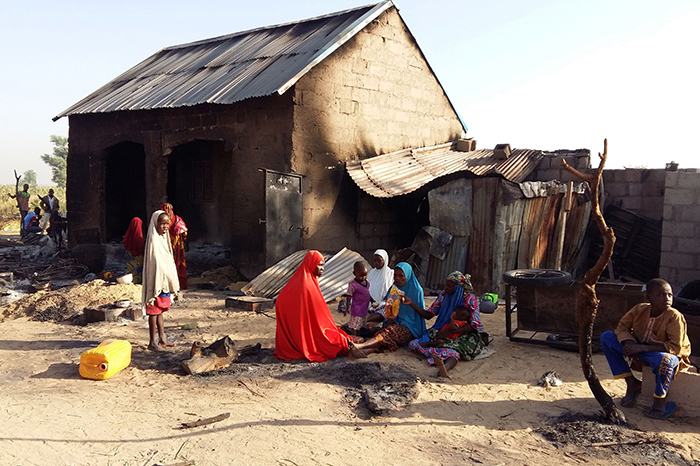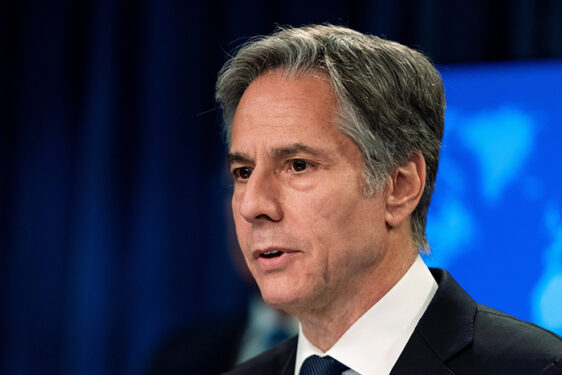
Advocates: ‘No logical basis’ for U.S. State Department’s Stance
PROSPECT HEIGHTS — The Biden Administration’s claim that it has a firm grip on diplomatic relations with Nigeria is baffling, say Brooklyn-based groups worried about escalating Christian persecution in the West African nation.
The advocates point to violence against Nigerian Christians from militant Islamists, such as the group Boko Haram, and marauding herdsmen who pillage Christian-owned farms and communities.
They expressed confusion over the recent removal of Nigeria from the State Department’s list of countries known as the world’s worst violators of religious freedom. A nation on this list is considered a “Country of Particular Concern” (CPC), as Nigeria was designated in 2020 by the Trump Administration.
But, in mid-November, Secretary of State Antony Blinken released an updated CPC list with no mention of Nigeria, prompting dismay among people who assert that violence against Christians has worsened there over the past year.
“We’re baffled,” said Ed Clancy, outreach director for Brooklyn-based Aid to the Church in Need-U.S. “By every single measure, Nigeria has gotten worse.”
Father Cosmas Nzeabalu is coordinator of the Nigerian Apostolate for the Diocese of Brooklyn, which is home to thousands of West African Catholics and Christians. He said the unchecked flow of guns to terrorists and herdsmen has fueled the violence against Christians.
“Religious intolerance has culminated into so much killing,” said Father Nzeabalu, parochial vicar at St. Mary Magdalene Parish in Springfield Gardens, Queens.
“And,” he added, “because people have got access to guns, they have moved from a religious crisis only to a high level of kidnapping, where people who are moving around the streets are kidnapped for ransom.”
“After careful review, the Secretary has assessed that Nigeria does not meet the legal threshold for continued designation under the International Religious Freedom Act,” a State Department spokesman wrote in a statement to The Tablet.
“We continue to have genuine concerns about the state of religious freedom in Nigeria, which are well documented in the annual IRF (International Religious Freedom) Report, and we will continue to press the government to address these.”
Countries that did make Blinken’s CPC list in 2021 included Burma, the People’s Republic of China, Eritrea, Iran, North Korea, Pakistan, Russia, Saudi Arabia, Tajikistan, and Turkmenistan.

While Nigeria didn’t make the CPC list, Blinken did tag Boko Haram and ISIS-West Africa among “Entities of Particular Concern.” These are the State Department’s designations for “non-state actors” known for severe violations of religious freedom.
The U.S. Commission on International Religious Freedom advises the State Department on CPC designations. Its members said they were appalled by the omission.
“USCIRF is especially displeased with the removal of Nigeria from its CPC designation, where it was rightfully placed last year,” said Nadine Maenza, the USCIRF’s chair.
Maenza noted that the State Department’s own IRF report contains enough facts on Nigeria to warrant its return to the CPC list.
“We urge the State Department to reconsider,” she said.
According to the International Religious Freedom Act, the Secretary of State declares CPC designations under authority delegated by the President.
A CPC is a nation guilty of severe religious freedom violations, including torture, prolonged imprisonment, abductions, or denials of life, liberty, and safety. Nations on the list are subject to U.S. economic sanctions.
Clancy and Father Nzeabalu said that the Nigerian government led by President Muhammadu Buhari deserves CPC status because it has done little to prevent the violence. Thus, Clancy added, Blinken’s stance on Nigeria has “no logical basis.”
“I’ve searched high and low,” he said on Jan. 4. “They haven’t given us rational evidence — an explicit reason saying that in the last year, things have gotten better. Nothing.”
ACN data reports that about 3,300 Nigerian Christians died for their faith each year from 2011 through 2021. But an estimated 3,500 people also died during the first seven months of 2021 alone, Clancy said.
“Something like 1,100 schools in the northwest of Nigeria are essentially closed or limited in the time that they’re open, because of fear,” he added.
Clancy noted that Christ the King Major Seminary in the state of Kaduna, also in northwest Nigeria, was attacked by bandits in October, despite the posting of armed guards.
“Seminarians were taken captive,” he said. The State Department, Clancy said, concludes that the violence doesn’t “rise to the legal definition as described in the 1998 International Religious Freedom Act.”
“Okay,” he added, “so, then, what does?” The CPC list was released around the same time Blinken was making his first diplomatic trip to Africa, which included a stop in Nigeria.
The department’s spokesman told The Tablet that Blinken, “emphasized to President Buhari that advancing human rights — including religious freedom protection — remains a foundation of U.S. interests in Nigeria.”
He added, “Key religious freedom concerns include the arrest and detention of individuals for blasphemy or similar charges, creeping implementation of Sharia in the country’s northern states, abuses and discrimination against Shia, and failures by the government to address societal violence, including attacks on clergy and places of worship.”
Father Nzeabalu said he believes the Biden Administration recognizes that Nigeria has great influence on the African continent, while also controlling vast natural resources, like oil. Therefore, he said, Blinken’s visit was probably meant to appease the Buhari government.
“I think he went strictly based on American interests and not to take care of what the problem with Nigeria is,” he said.
Father Nzeabalu noted that Nigeria’s national elections are set for 2023, and he hoped its honorable leaders would promote a “non-tribal” candidate who would not favor one group over others, but also work for shared safety and prosperity.
